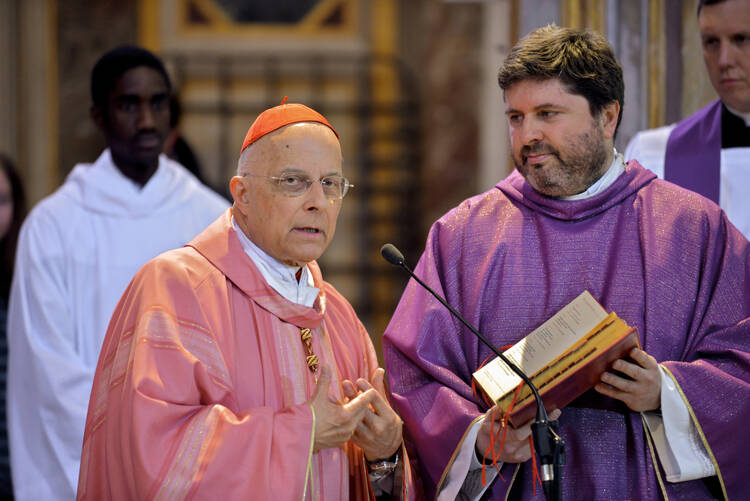Late news is that the discussion in the General Congregation of cardinals went overtime, and not everyone got to speak as time ran out. The Vatican Press Office said 28 spoke in the last session, for a total of 161, the Irish Times reported. Among the presentations that was made Monday morning was one by the cardinal who sits on the board of the Vatican bank, which has long been under fire for lax administration that has allowed its manipulation for bad purposes, including money laundering; see the report by Nicole Winfield of the Associated Press. Also see this backgrounder by the Canadian Broadcasting Company. The men who will begin deliberations on electing a new pope Tuesday afternoon will certainly have no doubt that the problems piling up in the papal inbox are considerable.
La Stampa quoted Father Federico Lombardi as saying Monday afternoon that black smoke is expected at 8 p.m. Rome time (3 p.m. EST), because it is highly unlikely that a two-thirds majority will be gained on the first vote.
They got a comparative break on Sunday, when most celebrated Mass in their titular Roman churches. The legal fiction is that the cardinals elect the pope, the bishop of Rome, because they are the pastors of the principal churches of the Diocese of Rome, and reports indicate that there was much enthusiasm for them. Cardinal Timothy Dolan seemed to be at his jovial best, kissing babies after Mass (demeanor that flabbergasts the Romans; see Michael Paulson’s profile in The New York Times), and Cardinal Sean O’Malley relished his chance to be a parish priest for an hour (Lisa Wangsness of The Boston Globe describes the scene). And talk of Americans being a possible choice struck wonder and enthusiasm among ordinary Catholics (see the Globe article, also Monday). The notion of an American also made organizational sense to contributor Thomas Basile on the Forbes magazine website.
David Gibson of Religion News Service has a thoughtful piece assessing the internal process of a conclave. He points out that conclaves have run three days or less in the last century, something that the experts he interviewed attribute to group dynamics, a bandwagon effect among the cardinals.
Writing for the website of Our Sunday Visitor, Austin Ivereigh also thinks this will not be a long conclave, though its outcome seems far from certain as it begins.
John Allen points out for the National Catholic Reporter how a recent decision by the Congregation for Doctrine clearing a theological book by a Spanish priest of charges of unorthodoxy has, in effect, boosted the chances of Cardinal Gianfranco Ravasi, “currently president of the Vatican’s Council for Culture, and arguably the single most intriguing mind among the 115 prelates who will soon file into the Sistine Chapel.”
On his own blog, John Thavis relays reports in the Italian press that the Argentine cardinal who ran second to Benedict XVI in the last conclave (and who seemed to throw his support behind Benedict’s cause), is attracting new interest. Though he is older, at 76, Cardinal Jorge Maria Bergoglio has attracted interest with his intervention in the General Congregation suggesting that he has “the energy and the inclination to do some house-cleaning in the Roman Curia.”
Victor L. Simpson, longtime Associated Press reporter in Rome, has a good scenesetter, saying that “this time there are no star cardinals and no big favorites, making the election wide open and allowing the possibility of a compromise candidate should there be deadlock.”
Concerns about the dangers of having two popes continue to get attention in the Italian press; see the report in Espress Online.
And some fans of Benedict think the cardinals have one choice in front of them, to reelect the pope emeritus.
For an American in Rome, it is easy to feel out of place. Even for a very churchy Catholic, the experience of receiving communion is a signal that you are on different turf. Communion in the hand is largely the norm in the United States; it is generally not done in Rome. We are used to seeing clergy in business suits or more casual clothes; cassocks are the norm in Rome. How much more difficult for those who may not be prepared for the old-time religion. No surprise here, but see the questions about the role of women in the church, particularly in public life around the Vatican in this Boston Globe report. The questions are not unfair, and the fact they are not often considered at such occasions is an obstacle to many sincere women.
The US Conference of Catholic Bishops has published the prayerbook and other liturgies for the conclave and related events, with a text in Spanish and English. Catholic News Service has a video on YouTube describing conclave events, which captures the dignity and beauty of the setting, with brief comments from cardinals who took part in past conclaves. And there is a terrific CNS video on Romans and the papacy, a reminder to the rest of us of why Italians may have different expectations than we do.
Catholic World Report has a helpful rundown for watching for news from the conclave over the next several days, complete with a schedule in Eastern Standard Time.
And to rapidly interpret the announcement when the senior cardinal deacon comes to the balcony of St. Peter’s, see this fascinating guide from the Fellowship of Catholic University Students (FOCUS). That way, you might be the first to shout the news from your own window.
You can also get a call on your smartphone or receive an email when white smoke does go up.
I will post here as the conclave goes on, though the late-day timetable will be a challenge. But it’s a great story.








